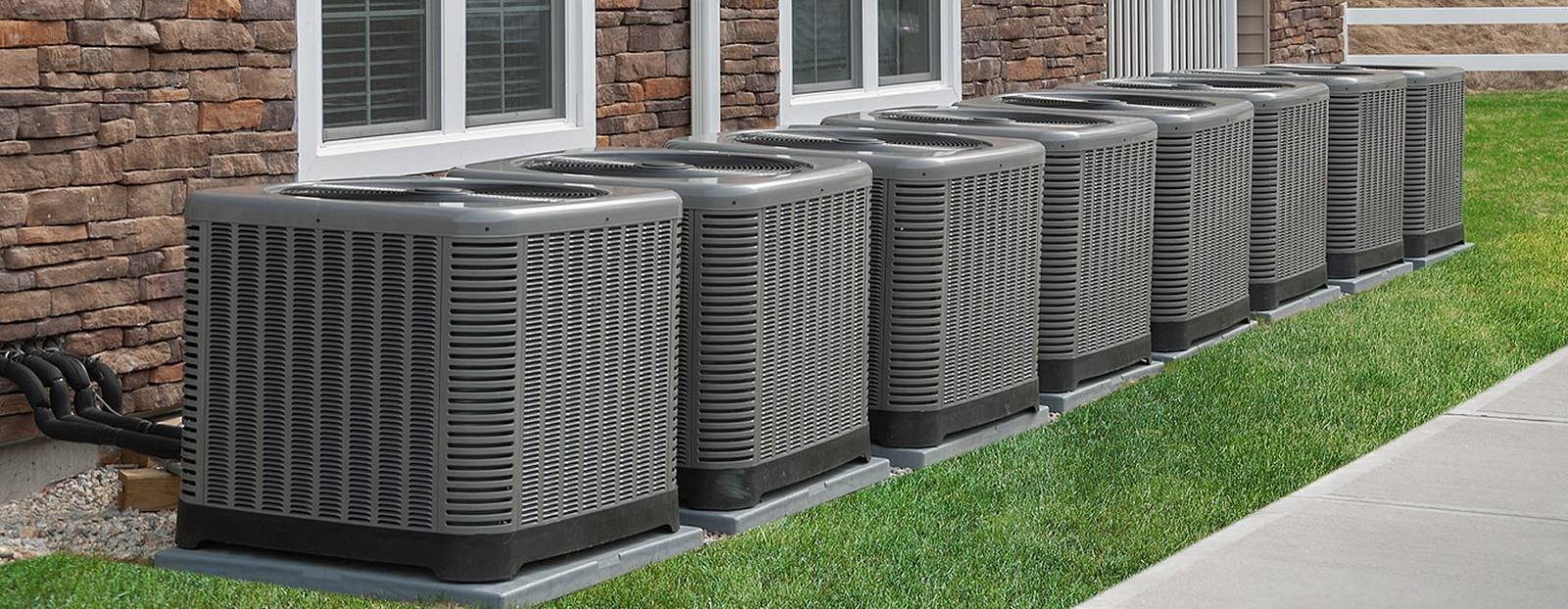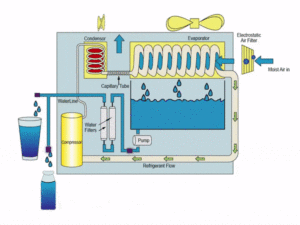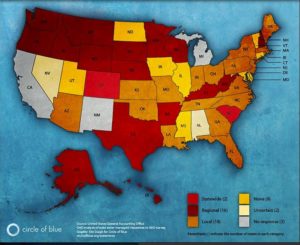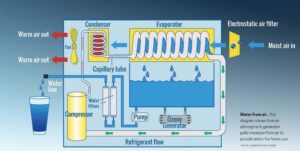Keeping Cool in the Sunshine State: A Guide to HVAC Maintenance and Repair in South Florida
HVAC systems and their importance in South Florida
HVAC stands for heating, ventilation, and air conditioning. These systems are used to control the temperature, humidity, and air quality in buildings. They are an essential component of modern buildings, especially in regions with hot climates like South Florida.
The heating component of an HVAC system is responsible for providing warmth during colder months. In South Florida, this component is used less frequently due to the warmer climate, but it still serves an important function on the occasional cold days.
The air conditioning component of an HVAC system is responsible for removing heat and humidity from the building. In South Florida, where summers can be extremely hot and humid, this component is of paramount importance. Air conditioning is essential for maintaining the comfort of building occupants, especially during the peak of the summer heat.
Overall, HVAC systems play a crucial role in maintaining the health and comfort of building occupants in South Florida. They help keep indoor temperatures comfortable, remove heat and humidity, and provide fresh air to the building. Regular maintenance and repairs are essential to ensure that HVAC systems continue to function properly and efficiently.
It’s also worth noting that, in the tropical climate of South Florida, those AC units are heavily used and need to work at full capacity, meaning that a well-maintained unit is important to save energy and avoid high bills. And for businesses and public places, it’s even more important to have a properly working HVAC system to avoid discomfort and unpleasant stay for customers, which will hurt the business in the long run.
Specific Challenges facing HVAC systems in South Florida
South Florida, with its hot and humid climate, presents a number of unique challenges for HVAC systems. These challenges include:
- High temperatures and humidity: The high temperatures and humidity in South Florida put a lot of stress on HVAC systems, which can lead to increased wear and tear and reduced efficiency.
- Salt air corrosion: The coastal location of South Florida means that HVAC systems are exposed to salt air, which can cause corrosion of metal parts and other damage over time.
- Storms and power outages: South Florida is subject to storms and hurricanes, which can damage HVAC systems and disrupt power. Preparing an HVAC system for storms and hurricanes, and having backup plans in case of power outages, is important.
- Energy Efficiency requirements: As we previously mentioned, Florida has a mandatory energy-efficient building code, which in turn also applies to HVAC systems. HVAC systems must meet these efficiency requirements, which can be challenging in such a hot and humid climate.
- Maintenance and repair: Due to the high usage and the challenging climate conditions in South Florida, regular maintenance and repair of HVAC systems are even more important to ensure optimal performance and longevity.
To combat these challenges, it’s important for building owners in South Florida to invest in high-quality HVAC equipment, such as units that are designed to withstand the rigors of a coastal environment and perform regular maintenance, repairs, and inspections, to ensure that their systems are working as efficiently and effectively as possible.
Properly selecting an HVAC contractor, who is experienced in working in the South Florida climate, and having a good maintenance contract with them will also help to ensure that your HVAC system is well-maintained and is able to handle the unique demands of the South Florida climate.
The purpose of an HVAC article about South Florida is to educate and inform readers about the unique challenges that HVAC systems face in this region and provide them with the knowledge and resources they need to properly maintain and repair their HVAC systems in order to keep them running efficiently and effectively.
Importance of HVAC Systems in South Florida
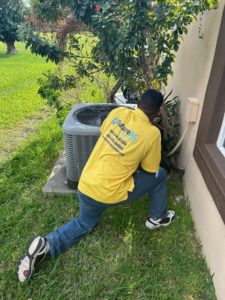 HVAC (heating, ventilation, and air conditioning) systems are essential for maintaining a comfortable and healthy indoor environment, especially in areas like South Florida where the climate can be hot and humid. These systems help to control the temperature, humidity, and air quality inside a building, which can have a significant impact on the health and well-being of the people who live or work there.
HVAC (heating, ventilation, and air conditioning) systems are essential for maintaining a comfortable and healthy indoor environment, especially in areas like South Florida where the climate can be hot and humid. These systems help to control the temperature, humidity, and air quality inside a building, which can have a significant impact on the health and well-being of the people who live or work there.
In South Florida, the heat and humidity can make it difficult to stay cool and comfortable, especially during the summer months. HVAC systems can help to mitigate this by providing cool, dry air to keep the indoor temperature at a comfortable level. Additionally, these systems can also help to reduce the growth of mold and mildew, which can thrive in warm and humid environments and can cause health problems for people who are sensitive to them.
Ventilation is also crucial in South Florida, as it helps to circulate fresh air into the building, which can reduce the build-up of pollutants and improve indoor air quality. Additionally, proper ventilation can help to reduce the concentration of carbon dioxide, which can accumulate inside a building and cause drowsiness, headaches, and other health problems.
Air conditioning and dehumidifying systems are the backbone of keeping buildings cool and comfortable in South Florida, which can also help to reduce the strain on the power grid during peak usage time of the year which is summer.
Regular maintenance of HVAC systems is also important in South Florida to ensure that they are running at peak efficiency and to reduce the risk of breakdowns. A well-maintained HVAC system will not only keep the indoor environment comfortable but also save energy and money on utility bills in the long run.
In summary, HVAC systems play a crucial role in maintaining a comfortable and healthy indoor environment in South Florida, especially during the hot and humid summer months. They help to control the temperature, humidity, and air quality inside the building, which can have a significant impact on the health and well-being of the people who live or work there.
Common HVAC Problems in South Florida
There are several common problems that can occur with HVAC systems in South Florida, which can include:
- Clogged air filters: When the air filters in an HVAC system become clogged with dirt and debris, it can restrict the airflow and cause the system to work harder to circulate the air. This can lead to a reduction in energy efficiency and an increase in energy costs.
- Refrigerant leaks: An HVAC system uses refrigerant to cool the air, and if there is a leak in the system, it can cause the system to lose efficiency and fail to cool the air properly. This can also be harmful to the environment.
- Electrical issues: Wiring and other electrical components in an HVAC system can become damaged or worn over time, which can cause the system to malfunction or even pose fire hazards.
- Drainage issues: Air conditioning systems produce condensate, which needs to be drained out of the system. Blockage in the drainage pipe or overflowing condensate pan can cause water damage and reduced cooling performance
- Dirty coils: The coils in an HVAC system can become dirty over time, which can reduce their effectiveness in transferring heat and can cause the system to work harder to cool the air.
- Thermostat problems: A faulty thermostat can cause the HVAC system to shut down or not turn on, preventing it from regulating the temperature and humidity properly
- Duct problems: Ducts that are leaky, poorly sealed, or clogged with debris can restrict airflow and reduce the efficiency of the HVAC system.
Regular maintenance and inspections can help to prevent and identify many of these problems before they become major issues. It is recommended to schedule regular checkups with a professional HVAC contractor to ensure that the system is running efficiently and that any problems are identified and addressed in a timely manner.
HVAC Maintenance and Upkeep
HVAC maintenance and upkeep are important to ensure that the system is running efficiently and effectively, and to extend the lifespan of the equipment.
Some of the key aspects of HVAC maintenance and upkeep include:
- Air filter replacement: Air filters should be checked and replaced on a regular basis, as dirty or clogged filters can restrict airflow and reduce the efficiency of the HVAC system
- . It is recommended to replace the filter every 1-3 months, depending on the usage and environment.
- Coil cleaning: The coils in an HVAC system can become dirty over time, which can reduce their effectiveness in transferring heat. They should be inspected and cleaned regularly to ensure that they are working properly.
- Refrigerant levels: The refrigerant levels in an HVAC system should be checked and adjusted as needed to ensure that the system is running efficiently and effectively.
- Thermostat calibration: A thermostat should be calibrated regularly to ensure that it is reading and controlling the temperature accurately.
- Duct cleaning: Ducts should be inspected and cleaned as needed to remove dust, debris, and other contaminants that can restrict airflow and reduce the efficiency of the HVAC system.
- Electrical components: The electrical components in an HVAC system, such as wiring and capacitors, should be inspected and replaced as needed to ensure that they are functioning properly.
- Compressor and fan check: The compressor and fan are the backbones of the AC system, they need to be checked and cleaned regularly to ensure they are running properly and at their optimal capacity.
Regular maintenance and upkeep can help to prevent problems before they occur and can extend the lifespan of the HVAC system. It is also recommended to schedule a professional maintenance check at least once a year with an HVAC contractor to ensure that the system is running efficiently and effectively. This will also help to identify any problems early on, so they can be addressed before they turn into major repairs.
Upgrading and Replacing HVAC Systems in South Florida
Upgrading or replacing an HVAC (heating, ventilation, and air conditioning) system in South Florida can be a significant investment, but it can also bring significant benefits in terms of energy efficiency and comfort.
When considering an upgrade or replacement, it’s important to take into account the age of your current system, the efficiency of the equipment, and the overall condition of the system. If your current system is more than 10 years old and has a high repair cost, it may be more cost-effective to replace the system rather than continue to repair it. Similarly, if your energy bills are high and you’re not comfortable in your home, it may be time to consider an upgrade.
When choosing a new system, it’s important to consider the size of your home, the climate in your area, and the specific needs of your family. It’s important to choose a system that is the right size for your home and to ensure that it has a high SEER (Seasonal Energy Efficiency Ratio) rating, which indicates the efficiency of the equipment.
In South Florida, due to the tropical weather condition, you may want to consider a geothermal heat pump, which can provide both heating and cooling. Since these systems use the stable temperature of the earth as a source of heat instead of outside air, they can be very efficient in warm climates.
It is important to hire a qualified contractor who will be able to assess your specific needs and recommend the right system for your home. they should also do a proper load calculation, duct design, and compliance with local building codes, and safety and safety measures.
An upgrade or replacement can be a big investment, so it’s important to do your research and make an informed decision. With the right system, you can enjoy lower energy bills, improved comfort, and a more environmentally friendly home.
Steps to improve the efficiency and longevity of their HVAC systems in South Florida.
If you live in South Florida, it’s important to take steps to improve the efficiency and longevity of your HVAC system. The high humidity and heat in this area can put extra stress on HVAC systems, making regular maintenance and upkeep even more crucial.
Here are a few specific steps you can take to improve the efficiency and longevity of your HVAC system:
- Schedule regular maintenance: Have a professional HVAC technician inspect and maintain your system at least once a year. This will help to ensure that your system is running at its best and that any potential issues are identified and addressed before they lead to a breakdown.
- Change air filters regularly: Air filters play a critical role in maintaining the efficiency and performance of your HVAC system. Make sure to change them at least once a month, or as needed, to keep the system running smoothly.
- Insulate ducts: Insulating your ducts can help to keep the cooled or heated air inside the ducts, rather than leaking out into attics or crawl spaces, leading to energy loss.
- Make sure your HVAC system is the right size for your home: A system that’s too small or too big for your home can lead to higher energy costs and poor performance.
- Properly use and maintain thermostat: Ensure that the thermostat is properly calibrated, placed in the right location, and program it to save energy costs.
By taking these steps to improve the efficiency and longevity of your HVAC system, you can help to reduce your energy costs, improve indoor air quality, and prolong the lifespan of your system. It also shows your commitment to being environmentally friendly.
Conclusions
Regular maintenance and upkeep of heating, ventilation and air conditioning (HVAC) systems are especially important because these systems play a critical role in ensuring the comfort and indoor air quality of a building. Without regular maintenance, HVAC systems can become less efficient, leading to higher energy costs and potential breakdowns. Dust, dirt, and other debris can also accumulate in the system, leading to poor indoor air quality and potential health problems for building occupants.
Regular maintenance can include tasks such as cleaning and replacing air filters, inspecting and cleaning ducts, and checking for and sealing leaks. Additionally, regular inspections of the system can help to identify potential issues, such as worn or damaged components, that can be repaired or replaced before they lead to a breakdown.
By performing regular maintenance and upkeep on HVAC systems, energy efficiency and overall performance can be improved, which can save money on energy costs and prolong the lifespan of the system. It will also help to ensure that the building’s occupants are comfortable and that the indoor air quality is healthy.

